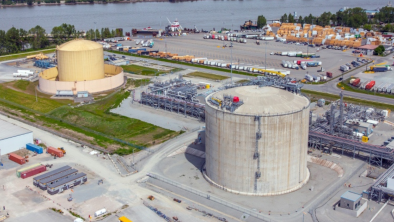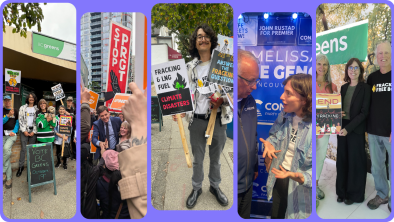BC Supreme Court lawsuit targets water use by resource extraction industry in the province
Business in Vancouver

Ecojustice Canada claims B.C.’s oil and gas commission is a serial Water Act violator
The BC Oil and Gas Commission (BCOGC) has repeatedly violated the province’s Water Act, alleges environmental law charity Ecojustice Canada.
In a lawsuit filed November 13 in BC Supreme Court, Ecojustice, on behalf of the Wilderness Committee and the Sierra Club of British Columbia environmental advocacy organizations, accuses the BCOGC of granting energy producer Encana Corp. (TSX:ECA) continuous short-term water licences for its natural gas drilling operations in northeastern B.C.
“We are seeking an order declaring the commission’s practices are unlawful and in violation of the Water Act,” Karen Campbell, a lawyer with Ecojustice, told Business in Vancouver. “We’re concerned, and our clients are concerned, that there is no comprehensive tracking of water being done.”
With a liquefied natural gas boom hovering over the province, some believe the lawsuit highlights the need to understand how much drilling and, subsequently, how much water the burgeoning LNG industry will need.
“This provides some much-needed further light on how much water is being used in the sector,” said Ben Parfitt, resource policy analyst with the Canadian Centre for Policy Alternatives. “And it shows the great potential for dramatic increases in water withdrawals if the LNG industry is established.”
According to the claim, a short-term water licence, authorized by the BCOGC under section 8 of the Water Act, permits a company to draw surface water – generally from lakes, rivers and streams – for up to 24 months. If a company needs water for a longer period, it must seek a long-term water licence, a mechanism also granted under the Water Act.
Ecojustice says it received, via an access to information request, 80 files from the BCOGC containing 1,352 short-term approvals dating back to 2006. Of the approvals, 866, about 64%, were for longer than 24 months.
Prior to March 2013, the month the Water Act was amended, short-term water approvals were granted for a maximum of 12 months. Using that time limit, 1,121 of the 1,352 approvals were for longer than one year and considered in breach of the Water Act, according to Ecojustice.
In its lawsuit, Ecojustice is challenging 83 current approvals, because many of the instances received in the BCOGC files have expired.
None of the claims allegations have been proven in court.
Eoin Madden, climate campaigner with the Wilderness Committee, said the data illustrates systemic “rubberstamping” of requests by a commission that favours industry.
Maden said that between February 2007 and October 2010, four BCOGC approvals allowed Encana to draw the equivalent of 880 Olympic-sized swimming pools of water from the Kiskatinaw River near Dawson Creek.
“The mandate of the oil and gas commission is to help oil and gas, not worry about fresh water,” said Madden. “They are not the right people to oversee this.”
Because the company is preparing a formal response, Jay Averill, Encana spokesman, declined to comment on the specifics of the suit.
In an email to BIV, Hardy Friedrich, BCOGC’s manager of communications, wrote: “The BC Oil and Gas Commission is aware of the lawsuit and is currently reviewing the information. The commission takes its responsibility for water allocation very seriously and all applications go through a thorough review process. This process ensures all water levels are maintained.”
Currently, B.C. produces about 3.5 billion cubic feet per day (bcf/d) of marketable natural gas, most of which is exported.
If three large-scale LNG export facilities are built – Apache Corp. (NYSE:APA) and Chevron Canada’s (NYSE:CVX) Kitimat LNG, Shell Canada’s (NYSE:RDSA) LNG Canada and Petronas’ Pacific NorthWest LNG – natural gas production in B.C. will need to nearly triple.
That spike in production will require significantly more wells to be drilled, said David Hughes, an energy consultant and former geologist with the Geological Survey of Canada.
And that translates into a need for significantly greater amounts of water used in drilling.
While water use can vary from area to area and from well to well, a 2012 BCOGC study found the average water used to drill a well in the Horn River Basin in Northeastern B.C., culled from seven different well pads, was 61,612 cubic metres. One cubic metre is the equivalent of 1,000 litres.
And as well production declines over time more water will likely be needed.
Said Hughes: “The higher the gas production goes, the more wells you need to offset the decline and the more water you will use.”


